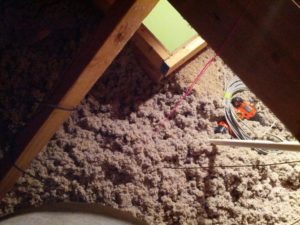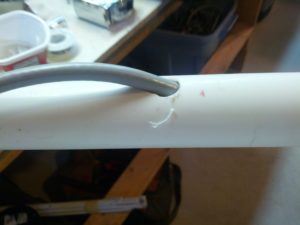Tag Archives: attic
On March 30, I went into my attic to install a few antennas. I learned a few things that bear passing on. Some of these are in pictures, some are text. These are in no particular order. These assume you have cellulose insulation (the type that’s blown in).
- Be ready for a dusty environment. If you don’t wear a dust mask, be prepared to blow black snot out of your nose
- If you wear glasses, make sure they are in no danger of falling off (I almost lost mine, that would have been bad news to drop them into the insulation)
- Make sure you have extra batteries for cordless tools
- Make sure coax is supported at the top. A 20 foot run of coax can be heavy, and you don’t want the line stressed
- Make sure you have a flashlight (as well as an area lamp, like a clip-lamp)
- Take a plastic rake up there with you. Use it to move the insulation around.
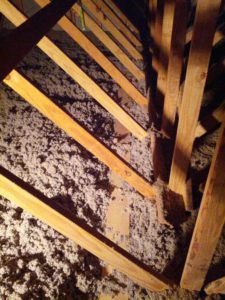
Look for things like a catwalk (like my attic has), just make sure you’re walking on wood and not PVC! Also, don’t expect the catwalk to be on both sides (in mine, it is not).
-73-
After installing my first HF attic dipole and noticing that I can hit Alaska and the Carribean really well and can’t hear New England at all, I decided I want another that is perpendicular to it (then maybe I’ll hit New England and Arizona… and Hawaii!).
I decided to do this antenna a little differently. Consider it an experiment. While I went to a lot of great lengths to put traps in my prior antenna (which shortened it’s length considerably), I decided on this one I want to try window line and see if the interference problem caused by my plasma TV is different. If not, I may be off of 40 and lower until I replace the TV with an LED TV.
Since the window line will be going down along a ventilation shaft that’s pretty large, the one concern I have is that I can’t put metal conduit in the shaft (one thing I wanted to try was to put a grounded metal conduit in the ventilation shaft and see if that fixes the interference problem).
So anyway, the pictures are below.
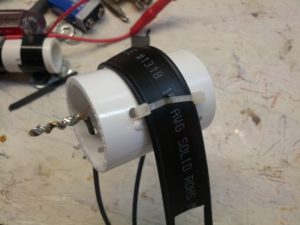
This is the stress reliever in the center insulator. I drilled three holes in a 3/4″ PVC coupler and used two wire ties to ensure that there isn’t too much stress on the wire joints.
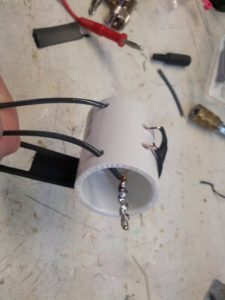
This is the insulator in the center of the dipole. The long wires were soldered to the twin-lead. The PVC coupler allows for me to hang it via mason’s line.
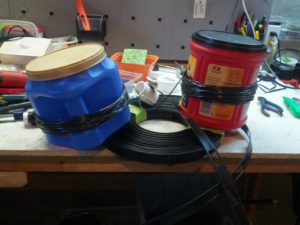
The two sides of the dipole – wires at ~33′ each – are coiled around CLOSED coffee cans, and the window line is coiled. Everything is taped with masking tape so it can be removed easily. The cans have to be closed due the insulation in the attic – open cans would get insulation in them, closed cans do not.
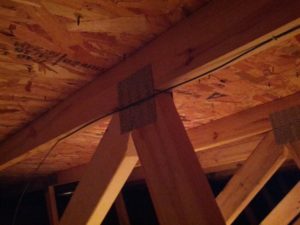
This was the only picture of the installation I could get. Let’s face it, it’s a wire in an attic, it isn’t going to be easy to see nor show anything interesting. Hope that metal plate doesn’t create a problem (there’s one on the other side too, so at least the metal plates will balance out).
I recently built a 2m groundplane antenna to be installed in my attic. Building an antenna is one thing, but getting it into the attic is another.
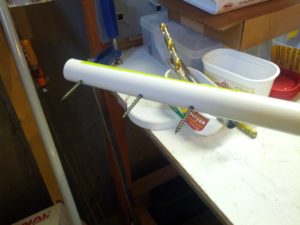
This is the lower mounting. Since this is in an attic, there is no need to be overly-worried about strength. There is no wind in the attic!
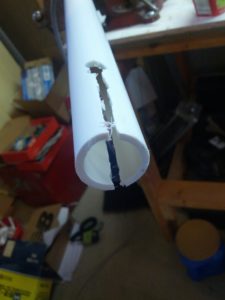
This is the slot that I used to be able to tighten the mast (which is just 3/4″ PVC) to the antenna connector.
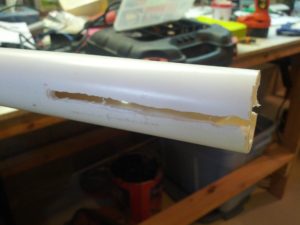
Another view of the slot in the mast. Needless to say, this was the one I did SECOND, after I got a little more comfortable with the wannabee-Dremel router attachment.
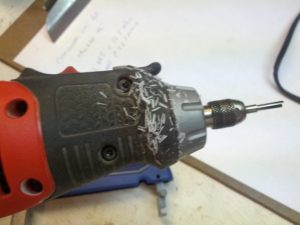
Side note, after you take a rotary tool with a router blade to a piece of PVC pipe, you will have at least a million of these little shards everywhere.
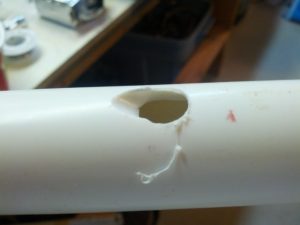
This is a detail of the coax hole. I drilled an initial 3/8″ hole, and then used a 5/16″ bit to finish the angle.
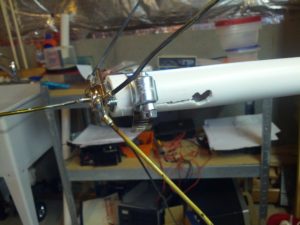
This is the finished mount. I used a hose clamp around the collar to hold the antenna mount to the PL-259 attached to the antenna’s SO-239.
I haven’t updated this in a while, not that there hasn’t been anything to update, it’s that I’ve been pretty busy.
In the past several months, I decided my trap vertical antenna in the backyard is a piece of shit. While operating in the 13 Colonies special event, I felt like I would have fared better yelling to people than using the radio. And playing some JT-65 after that made me think that the vertical is either sending everything straight up with no possible shot of reflection, or straight down in the ground. Not to mention, the guy behind me hates the thing. I think it pisses him off that he (not in my “community” can’t get the HOA to do anything about it. I haven’t been exactly secret about it’s existence, it is just that I don’t have a tower and a vertical hidden behind some trees isn’t in full view of my neighbors or the street. Well, except that guy, and he doesn’t count because he doesn’t pay into our neighborhood HOA. The HOA president has made it clear to me that the HOA will not get involved unless someone in the HOA has complained and nobody has.
My master plan was to finish a trap dipole antenna the weekend before the ARRL Sweepstakes and try to get on and at least make it half-way to a sweep. By finish, I mean that I’m going to build traps for 10, 15, 20, and 40 meters, tune the antenna, put it in the attic, and run cable down the ventilation shaft in the middle of the house.
So I learned a few things. One is that there is no way in Hell to do this without a good antenna analyzer. Another is that you should use the site that says “I constructed my traps using good quality RG-58/U coax scavenged from a discarded 10BASE-2 Ethernet cable.” should be used as guidelines. I don’t care how good quality of 10BASE-2 cable, no network administrator has used that shit since 1990!
Anyway, I found 100 feet of RG-58 to try this with (and at a damn good price). I realized almost immediately that this wasn’t going to work because damn good price is code for shit quality – the braid is aluminum. When I saw that, I immediately thought “WTF???” and tried to solder it just to make sure it wasn’t silver-colored copper or something else. Nope. Aluminum.
So I tried to make traps out of it using crimp connectors, which could have worked, but the crimp connectors don’t work too well on braid.
The following weekend was spent partially in Columbus for a meeting (on Saturday). Not being one to wake up at 4:30 AM for a long meeting, I went up on Friday and had even arranged another meeting at 2:30 in the afternoon. After that meeting, I dropped by Universal Radio and thought about buying some RG-58. Since they didn’t know if it was copper or aluminum braid, I bought RG-8X. With copper braid 🙂
Then came a weekend of winding traps. Ironically, this was on the weekend of the ARRL Sweepstakes. After having much difficulty, I found this awesome little piece of software by Tony Field, VE6YP. It is a coax trap calculator. Coax traps are a pain to make because the higher (than normal, or relative to most things a ham would build) Q. So after finding references to the capacitance per foot of “normal” RG-8X and inputting the other parameters, I found some combinations of PVC plumbing fittings and numbers of turns that would work. Of course the final traps I built, for 40 meters, were off, so I had to make a fix to those (and thank God I didn’t have to re-wind them, as I had run out of the coax I bought at Universal).
The following long weekend (Thanksgiving in the US) was spent with fixing turkey, pumpkin pie, and those 40 meter traps. I also tuned the antenna and hung it in the attic. That’s where I’m at. I tried to run the feed-line (that shitty RG-58 with the Aluminum braid, thanks to some crimp PL-259s). It’s stuck in the wall. I’m not sure how it is stuck, but I’m guessing there is a wire nest right between two sheets of OSB separated by the 2×8 flooring. Don’t ask me why there are two sheets of OSB. Normally there would be one on the top and nothing on the bottom (there’s drywall on the bottom of those same 2x8s where it’s above the living spaces, but there’s no need to have it below the floor in that area, especially with it being only a 2′ x 3′ space.
So I’m sitting here thinking “how do I get this damn wire down?” I really don’t want to pull it back and re-run it, but I may have to. I’ve been wondering if I can grab it with something, but it is 8 feet up the wall (guessing).
On the vertical, I think I’m going to leave it up for a while. It’s fuglier than sin, but since my neighbor supposedly (key word!) called the township who called the FCC a year ago but the only person to talk to me was our HOA president (the township zoning admin talked to the president and the HOA president told me all this), I’m not foolin’ with it. If they want me to do something, try talking to me. I’m not really a bad guy.
-73-

